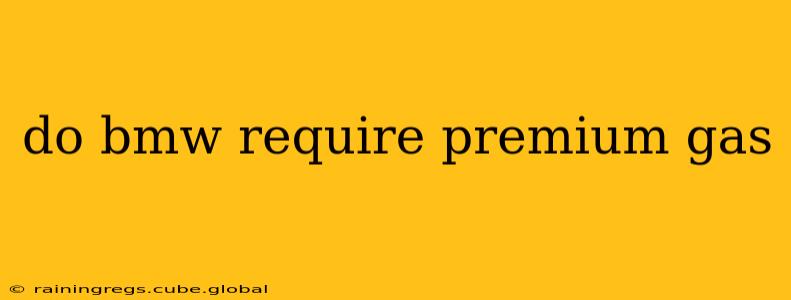Do BMWs Require Premium Gas? A Comprehensive Guide
The short answer is: most modern BMWs recommend, and often require, premium gasoline. However, it's not a simple yes or no answer, and understanding the nuances is crucial for optimal engine performance and longevity. This guide will delve into the specifics, answering common questions and clarifying the importance of fuel type for your BMW.
What type of fuel does my specific BMW model require?
The best place to find the definitive answer is your owner's manual. This document, specific to your year, make, and model of BMW, will clearly state the recommended fuel octane rating. Look for sections detailing fuel specifications or engine requirements. Failing to use the recommended fuel can void your warranty and potentially damage your engine.
Why do many BMWs require premium gas?
BMW engines are typically high-performance machines designed for power and efficiency. These engines utilize high compression ratios, which necessitates premium fuel (typically 91 octane or higher) to prevent knocking or pre-ignition. Knocking occurs when the air-fuel mixture ignites prematurely, leading to engine damage. Premium gasoline's higher octane rating is more resistant to this premature ignition, ensuring smoother operation and preventing potential harm.
What happens if I use regular gas in a BMW that requires premium?
While using regular gas in a BMW designed for premium might seem like a cost-saving measure, it's strongly discouraged. In the short term, you might experience decreased performance, reduced fuel economy, and potentially a noticeable pinging or knocking sound from the engine. In the long term, consistent use of lower-octane fuel can lead to significant engine damage, requiring costly repairs. This damage is often not covered under warranty.
Can I use mid-grade gasoline in my BMW?
While some BMW owners might consider mid-grade gasoline (e.g., 89 octane) as a compromise, it's generally not recommended. Mid-grade fuel may offer a slight improvement over regular gasoline, but it likely won't provide the complete protection against knocking that premium fuel offers. Sticking to the manufacturer's recommended octane rating is always the safest approach.
What are the signs my BMW is struggling with lower-octane fuel?
Several symptoms can indicate your BMW is not receiving the proper fuel. These include:
- Reduced engine performance: Noticeably less power and acceleration.
- Decreased fuel economy: Getting fewer miles per gallon than usual.
- Knocking or pinging sounds: A metallic clicking or pinging noise from the engine compartment.
- Check engine light: Illumination of the check engine light often indicates a problem, including incorrect fuel usage.
Does using premium gas always guarantee better performance?
While premium gas is essential for engines designed for it, using a higher octane than recommended won't necessarily yield significantly better performance. Your engine is calibrated for a specific octane rating, and using a higher octane will not magically boost power beyond its designed capabilities. It's more about protecting the engine from damage than maximizing horsepower.
In conclusion, understanding your BMW's fuel requirements is paramount for maintaining its performance and longevity. Always consult your owner's manual for the specific fuel recommendations and stick to them religiously. Using the correct fuel type protects your investment and ensures years of trouble-free driving.
